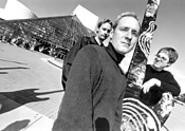The trio onstage is cute the way pop bands should be: clean-cut and blond and baggy-jeaned. The music is loud and good, part Weezer, part Barenaked Ladies, with a pinch of Dave Matthews. It's tough to understand the words, but that doesn't stop the crowd from singing the chorus with gusto.
It might be any band at any club in the naked city. But the bottle at the lead singer's feet isn't Jack Daniel's; it's Dasani. Nor is this the Agora; it's the activity room at Beachwood's Fairmount Temple, and there isn't a joint in sight.
The band is Eighteen, the biggest thing in Jewish rock.
The crowd is into it. Hands clap, heads bob, bodies sway. Bashful guys in baseball caps attempt something that resembles dancing. When singer Dan Nichols announces the next song -- something guttural that translates to "Kehila Kedoshah" in this alphabet -- girls screech. AAAH! AAAAAAAAH! It's Kehila Kedoshah!
The ascent of Jewish rock shouldn't be surprising. Christian pop became ubiquitous in the '90s and accounted for nearly 50 million album sales last year alone, according to the Gospel Music Association. But for the most part, Jewish pop was nonexistent. "Contemporary" Hebrew music was more Peter, Paul & Mary than Matchbox Twenty. Nichols, sincere and serious in the manner of the born-again, wanted to do more.
Nichols had worked in professional opera and, with a band called the Olskies, shared gigs with Hootie and the Blowfish and Ben Folds Five. But the Olskies went their separate ways, and Nichols moved to Nashville in 1994. There he befriended a fellow Jew, Mason Cooper, and they discovered a shared sense of possibility.
"We thought, 'Look what's going on in the Christian world,'" says Nichols. "We knew if we could do that in the Jewish world, it could be cool."
So Cooper and Nichols started writing "music that's Jewish and rocks," Nichols says. They started hawking the finished product to summer camps and temples in 1996. At first, making the pitch was hard. "We were playing to teenagers, and the people booking us were temple elders and rabbis," Nichols admits. "It took a while."
Even today, the band's success is modest. Its first two discs have sold about 3,000 copies each, and its gigs are mostly small. After Fairmount, the group headed to Beachwood to play the Hebrew school at the Temple Tifereth-Israel. But the work is steady, the bills get paid, and the fans are intense.
"We're booked through next June, and it's all calls that have come in," Nichols boasts. "We haven't made one call out."
"It's weird to say the kids are into 'Jewish rock bands,'" admits Staci Rosen, Fairmount's youth coordinator. "But they're really into it."
Notes 16-year-old Becki Cooper of Westlake: "The first time I heard they were having a Jewish rock concert, I was like 'Are you kidding? Who does that?' But it turned out to be really cool." She now plays Eighteen's Be Strong CD in her car: "I think it's something that could really become big."
Nichols believes Eighteen is the first Jewish pop band, but it isn't alone. The scene is small but flourishing: The Boston hair-farming band Yom Hadash touts the Beatles and Bee Gees as influences, Evën Sh'siyah plays steadily in Chicago, and a trio of comely coeds, Visions, may be Judaism's answer to the Spice Girls.
Buddhists, Muslims, and even Mormons are getting in on the act too. Utah-based A Joyful Noise cheerfully promises young Mormons "music you don't have to confess to your bishop." Buddhist rockers American Zen are already taking on their critics, wherever they may be: "Yes, I realize I'm a sight in your conservative eyes/ My long hair and California attitude, must make you want to curl up and die." Muslim rocker Jeremiah, who plays "songs of social commentary and mystic awareness," has released two albums, Some Songs for the New Brutality and The Dr. Jihad Collection.
Yet most of these bands will have trouble breaking beyond the youth-group circuit unless they can score with the secular. No other religion can rival Christianity's numbers. Christian pop star Michael W. Smith alone has sold nine million albums -- two million more than there are Jews in America.
Christianity also offers an easier segue into popular culture. It wasn't hard for Amy Grant to switch from cheerful tunes about loving God to cheerful tunes about love. Eighteen, on the other hand, sings many of its songs in Hebrew. Its biggest hit is "B'tzelem Elohim," which doesn't exactly scream "crossover."
"People go nuts for that song," Nichols says. "But there's not a doubt when you hear it. It is a Jewish song."
Which is kind of the point. The band started its Fairmount show with "Lo Yisa Goi," a song derived from Isaiah's ruminations on peace. "Kehila Kedoshah" is about the inherent excitement of the Torah.
Sixteen-year-old Jess Schecter admits to fighting with her brother over who gets to play their shared Eighteen CDs. But she can see the band's limitations: "If you don't know Hebrew, why are you going to want to listen to it? You can't understand it."
Alex Keller, a 14-year-old freshman at St. Edward High School, prefers punk rock and ska. But he has two Eighteen albums he's not embarrassed to share, even though his classmates are mostly Catholic. "I tried to talk to my friends about it, and they were like 'What are you thinking?'" he says. "Then they actually listened to it, and they were like 'Yeah, it's not bad.' It's good music. If you like music, you can like them. You don't have to be Jewish."
Keller may be right. After wowing Beachwood, Eighteen headed to play the Louisiana State Fair. Apparently it's Jewish Awareness Month in Redneck Country.
And if a Hebrew band can get a three-night run in Shreveport, it can probably play anywhere.


